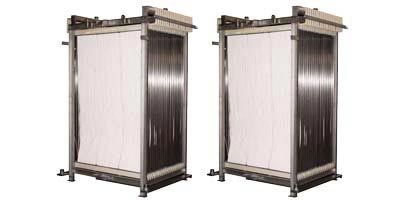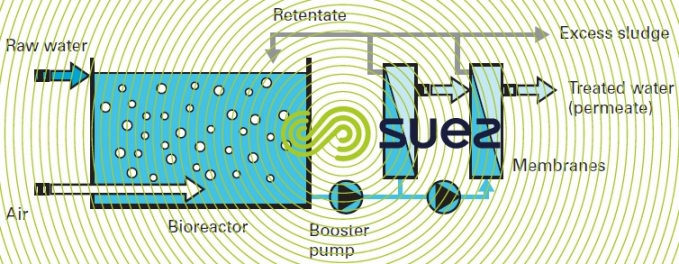The Benefits of Membrane Layer Bioreactors in Sustainable Wastewater Management
Membrane bioreactors (MBRs) stand for a critical development in sustainable wastewater management, properly combining biological therapy with advanced membrane filtration modern technology. As the demand for lasting remedies escalates, discovering the multifaceted advantages of MBRs may disclose unanticipated ramifications for the future of wastewater therapy systems.
Summary of Membrane Bioreactors
Membrane layer bioreactors (MBRs) represent a significant improvement in wastewater treatment innovation, integrating organic deterioration with membrane layer filtering to boost the effectiveness of the treatment procedure. This innovative system integrates the advantages of standard triggered sludge procedures with membrane innovation, permitting boosted solid-liquid separation. MBRs use semi-permeable membrane layers to separate treated water from biomass, leading to high-quality effluent that can be recycled or securely released right into the environment.
The operational style of MBRs usually entails a bioreactor where bacteria damage down organic issue, followed by a membrane layer device that filters the blended alcohol. This arrangement not only lessens the impact of the therapy facility however likewise permits greater biomass concentrations and decreased hydraulic retention times. MBRs are capable of treating a broader range of pollutants, consisting of nutrients and microorganisms, making them suitable for various applications, from local wastewater treatment to industrial effluent processing.
The integration of MBRs into wastewater administration systems is a measure of an expanding fad in the direction of effective and sustainable practices in environmental engineering. Their ability to create top notch effluent while decreasing space needs positions MBR innovation as an essential player in modern wastewater treatment solutions.
Enhanced Effluent Quality

The membrane layer filtering process acts as a physical obstacle, allowing the retention of bacteria and particulate issue, which contributes to a clearer and cleaner effluent (Membrane Bioreactor). In addition, MBRs run at greater biomass concentrations than standard triggered sludge systems, advertising extra reliable biodegradation of pollutants. This results in a reduction in biochemical oxygen demand (BODY) and total put on hold solids (TSS) levels in the last effluent
Additionally, MBRs show outstanding efficiency in dealing with difficult wastewater make-ups, such as industrial effluents and wastewater with high nutrient lots. Consequently, the effluent generated is usually of higher high quality, allowing for more flexible disposal choices and lowered environmental influence. Ultimately, the boosted effluent high quality attained through MBR innovation emphasizes its important function ahead of time lasting wastewater management methods.
Water Reuse Opportunities
The high-quality effluent generated by membrane bioreactors (MBRs) opens substantial opportunities for water reuse in different applications. MBRs effectively eliminate impurities, including pathogens, suspended solids, and organic matter, leading to cured water that fulfills or exceeds regulatory criteria for reuse. This quality enables the application of water reusing efforts throughout diverse industries.
One famous application remains in farming, where dealt with wastewater can be utilized for irrigation, promoting sustainable farming methods while saving fresh water resources. Additionally, MBR-treated effluent can be used for industrial processes such as air conditioning, cleaning, and as a process water source, substantially minimizing the need for safe and clean water in these operations.
In urban environments, MBRs facilitate making use of redeemed water for landscape irrigation, toilet flushing, and various other non-potable usages, adding to the general durability of water systems. Furthermore, the assimilation of MBR modern technology in decentralized systems help in handling localized water demands, specifically in water-scarce regions.
Reduced Ecological Effect
Exactly how can the adoption of membrane bioreactors (MBRs) add to a minimized environmental impact in wastewater management? MBRs substantially enhance the therapy effectiveness of wastewater while reducing ecological disruptions. Visit Website By incorporating biological therapy procedures with membrane filtration, MBRs effectively get rid of a large range of toxins, including natural issue, nutrients, and pathogens. This innovative purification leads to higher-quality effluent, which is essential for securing aquatic ecological communities and lowering the problem on natural water bodies.
In addition, MBRs operate at reduced hydraulic retention times compared to standard systems, resulting in smaller therapy plant footprints. This portable design minimizes land use, thus maintaining natural environments and biodiversity. The process likewise produces much less sludge than traditional approaches, reducing disposal difficulties and lowering greenhouse gas emissions connected with sludge monitoring.
Furthermore, MBRs promote the recuperation of valuable sources, link such as water and nutrients, contributing to a circular economic climate. By allowing water reuse for watering or commercial processes, MBRs aid alleviate freshwater scarcity, therefore advertising lasting water use practices. Eventually, the adoption of MBR innovation stands for a substantial stride towards reducing the environmental effect of wastewater administration systems.
Economic Benefits of MBRs

Furthermore, MBRs assist in the manufacturing of top notch effluent, which can be reused for various applications, such as agricultural irrigation and industrial procedures - Membrane Bioreactor. This reuse capability can substantially reduce water procurement costs, offering a financial incentive for markets dealing with strict water regulations
The compact layout of MBR systems likewise causes decreased land requirements, which is especially useful in metropolitan locations where realty is expensive. By minimizing area, towns and industries can conserve on land purchase and maintenance expenses.
Moreover, MBRs commonly need less constant upkeep and have a longer lifespan than typical systems, further adding to set you back financial savings. In recap, the economic benefits of MBRs-- varying from lowered functional expenses to land financial savings and effluent reuse-- make them a compelling selection for lasting wastewater administration, providing both long-term and instant economic advantages.
Conclusion
Membrane layer bioreactors stand for a transformative technique to lasting wastewater monitoring, integrating biological treatment with sophisticated membrane filtering for superior effluent high quality. Their ability for reliable impurity removal assists in water reuse, thereby preserving crucial freshwater resources. Furthermore, MBRs add to reduced environmental effects via small layouts and reduced sludge generation. Economic benefits further enhance their feasibility, making MBRs a promising option for resolving the challenges of wastewater treatment and promoting sustainable resource administration.
Membrane layer bioreactors (MBRs) represent an essential improvement in sustainable wastewater administration, successfully combining organic treatment with sophisticated membrane purification modern technology.Membrane bioreactors (MBRs) represent a substantial innovation in wastewater therapy innovation, integrating biological degradation with membrane purification to improve the effectiveness of the treatment procedure.Attaining boosted effluent high quality is one of the most considerable advantages of making use of membrane bioreactors (MBRs) in wastewater treatment.Additionally, MBRs show exceptional performance in dealing with tough wastewater compositions, such as commercial effluents and wastewater with high nutrient loads.Incorporating membrane layer bioreactors (MBRs) into wastewater monitoring not just minimizes environmental influence but additionally presents substantial financial advantages.